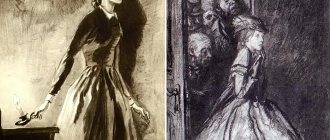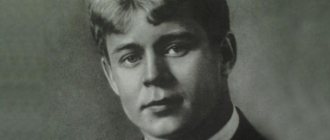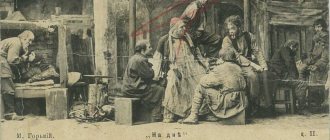Demon of the genius poet
The image of Lermontov's Demon comes from biblical stories. He is expelled from Paradise, must wander around the world and look for a shelter that does not exist. For many centuries he
“...the outcast wandered in the desert of the world...”.
For the Demon, century after century passes monotonously, insignificantly and without joy and pleasure.
"He spread evil without pleasure."
The author says that the spirit was once an angel.
“He shone, a pure cherub...”
An angel turned evil is a Demon created by a brilliant poet. Such images no longer exist in literature. Lermontov's subjective vision distinguishes the image from the usual evil representatives of Hell. The hero of the poem combines angelic and demonic traits. He
“...I once believed and loved...”
“...God’s curse has been fulfilled...”,
the angel's soul turned into stone, he cooled down, stopped feeling
"...Nature's warm embrace."
The exiles, like an evil spirit, became friends. The demon teaches people to commit sinful acts and extinguishes faith in the Almighty in their hearts.
“...I didn’t rule people for long, I didn’t teach them sin for long, I dishonored everything that was noble and I blasphemed everything that was beautiful.”
Not for long - this, in the understanding of the Demon, is centuries, but the evil is tired of the spirit. Why? People quickly accepted his lessons. Wars, hatred, malice and envy are not all the qualities that began to live among earthly creatures. The demon becomes sad and bored with doing what he should.
Demon Image
The image of the Demon in Lermontov's famous poem is an abandoned hero who dared to transgress the rules of good. He despises the limitations of human habitation. This portrait was taken by the author from the biblical legend about someone expelled from paradise. Mikhail Yuryevich remade the content in his own way. The punishment of the main person comes from the fact that he is doomed to wander absolutely alone until the end of time.
The image of a demon is the cause of evil, destroying everything in front of it. But despite this, he finds himself in close interaction with the opposite principle. Since the unclean is a converted angel, past events are perfectly remembered to him. The hero seems to pour out his accumulated revenge on the whole world. It is worth highlighting the fact that this image of a demon is very different from Satan or Lucifer. This is the Russian poet’s personal expression of the image.
The main meaning of the poem is that the hero strives to find a way to reincarnate. He is very angry at the fact that he is assigned the fate of dispersing evil throughout the human world. By an unexpected coincidence, he falls in love with a beautiful Georgian girl named Tamara. In this way, the hero wants to defeat God's punishment at all costs.
The image of the hero in this work is expressed by two main features. This is the attraction of heaven and the mysterious mystery. Therefore, the woman of the Earth is not able, due to her weakness, to resist the tempter. He is not the product of human imagination. Tamara can feel and touch it. Gradually he begins to visit her in her dreams. The demon is like air and can be inspired through the inner voice and breathing. In the poem we will not find a description of the hero’s appearance. In the girl’s feelings, he is like a bright evening, glows silently, like a star, slips away silently and without a trace. The Georgian woman is lured by the enchanting voice, attracts her. After committing the murder of Tamara's betrothed, he comes to her, gives her golden dreams, and relieves her of all earthly worries. The portrait is transformed with the help of a lullaby. This song contains the celebration of peace in the night, which is so characteristic of the romantic feature.
The chants that the Demon reproduces over time poison the heart of the poor girl in a world that does not exist. Earthly events and things do not attract her. Trusting her seducer, the Georgian woman leaves this world. This incident leads the Demon to even greater despair and consciousness of his inadequacy.
Angelic beginning
The demon is tired of the evil in his soul, he wants to be reincarnated, looking for something new in the world. Simply spreading evil among people is not enough for him. How to change black power? He falls in love with a beauty with an unearthly appearance. Love must cleanse the Demon, free him from God's punishment. The author shows the hero as attractive and strong. The character is mysterious and charming. He is a beautiful mystery, a vision of enchantment. In Tamara's mind the spirit takes shape, the night guest is visible and perceived. For the reader he is still a mystery, but sometimes here he begins to take on features. The demon becomes what is wanted, desired, loved. The author is not afraid to admit that a person lives by sinful dreams. The characteristics of the spirit do not frighten, but attract:
“looks like a clear evening”, “shines quietly like a star”, “glides without a sound or a trace.”
The demon is dangerous like any feeling, like a serpent is a tempter. The sadness inside the night guest helps to understand how difficult it is for the spirit to experience a new sensation that has settled without its knowledge and which cannot be controlled. Love
“it burns and splashes like a flame, then the thought crushes... like a stone...”.
classreferat.ru
The demon in the poem is depicted not as usual: an evil, disgusting and ugly messenger of hell, but as a “winged and beautiful” creature. The demon is not Satan, but a fallen angel who was cast out of heaven for the sin of rebellion and disobedience. He is deprived not only of death, but also of the gift of oblivion - such a punishment for his crime. Longing for a lost paradise, the loneliness of an outcast, the thirst for revenge, contempt for insignificant vain people - this is what drives him in a continuous struggle with the divine idea of \u200b\u200bgood and the whole of God's world and in some kind of tired, indifferent commission of evil. In the poem, the Demon appears before us in 3 images. The first is a bored demon, tired of doing evil. But everything changes when he sees the young Georgian bride Tamara. Second image. The power of earthly life and fleeting beauty, embodied in a flying happy dance, suddenly touches this lost soul and gives rise to “inexplicable excitement” in it. I involuntarily envied the incomplete joy of the earth. The Demon falls in love with Tamara... He looked like a clear evening... ... With eyes full of sadness and Alien tenderness of speech... The goal of the Demon is not another creation of evil, the death of a seduced soul. This is a rebellion against the world order established by God, an attempt to change fate and one’s sentence, to escape a painful eternity alone with evil and deserved punishment. He longs to find new happiness and life, to overcome the curse and expulsion from paradise, the angelic song of the nun Tamara awakens earthly love in the spirit and brings forth tears, but his tear itself is unearthly, it burns through the wild stone at the monastery walls. Third image. Lermontov shows with this eloquent detail that the love of the eternal genius of evil is dangerous, sinful, and disastrous for a weak mortal woman. The spirit wants to be reborn, get rid of eternal damnation and condemnation and be saved at any cost, even at the cost of the death of the young, sinless soul of a nun. Tamara dies and the fight for her soul begins between the Demon and the Angel. The Demon and evil triumph, but for suffering and sincere love, purity of soul and for trying to save a great sinner, all her sins are forgiven, the gates of heaven are opened, the bright angel rejects all the formidable demands and claims of the Demon on the trembling soul of the young nun. And the Demon is again left alone, without love and faith, in his boring, cold eternity and the gloomy world of world evil.
We recommend watching:
- “Demon”, analysis of Lermontov’s poem
- The image of the Demon in the works of M. Yu. Lermontov
- Analysis of the poem by M.Yu. Lermontov "Demon"
- Poem "Demon" - essay
- The image of the Demon in Lermontov's poem of the same name
- Lermontov's work on the poem "Demon"
- Analysis of the second part of Lermontov’s poem “The Demon”
- Essay on the topic: “The Demon” by Pushkin and “The Demon” by Lermontov
- Essay on the topic: Disunity of the Demon with the natural world
- Folklore in Lermontov's poem “The Demon”
Character of the representative of black forces
The Demon has many faces. He is proud and despises everything divine:
“He cast a contemptuous eye upon the Creation of his god...”
The demon knows how to be cunning and crafty. He settles in the souls of people and prevents them from living and acting as they would like, leading them away from their chosen path. People's dreams become treacherous. The Hero of Hell is immortal and is not afraid to commit dark deeds, he does not face punishment. The Demon does not like this existence. He wants danger, storms, turmoil. He hates this power and immortality. The spirit hates not only people. He is annoyed by the beauty of the world. He envies nature:
“...except for cold envy, Nature was not aroused by brilliance...”
The demon knows how to despise and hate; other feelings do not appear in his soul.
A summary of the poem “Demon” in detail in parts and chapters.
Part one.
Chapter I.
The “spirit of exile,” rejected by God, circled over the sinful earth and recalled the times when he was a cherub and knew neither malice nor confusion. Now these feelings do not let him go for a second.
Chapter II.
He has spent hundreds of years in monotonous boredom. He “sowed evil without pleasure,” because after so many years of aimless wandering, even he was tired of it.
Chapter III.
The fallen angel often hovered over the majestic Caucasus. The demon sees nature of extraordinary beauty. But are they really beautiful? After all, he has seen this many times. He was indifferent to the Terek and Daryal rivers, and even the pearl of Georgia - Kazbek.
Author: Mikhail Yurievich Lermontov
Chapter IV.
The Demon did not admire the lush valleys of luxurious Georgia, where thousands of plants bloomed in a cluster of rocky mountains and deep gorges, emitting an unprecedented aroma.
Chapter V
Near the Aragva River stands the tall house of the wealthy merchant Gudal. The old man lives with his only daughter - beautiful, kind and modest Tamara.
Chapter VI.
Today there will be a big celebration in the house: Tamara is marrying a young prince. All the guests are waiting for the appearance of the chosen one, but most of all the young beauty is impatient to see her future husband.
The roof is covered with carpets, the bride and her friends are playing and singing. And so the bride takes a tambourine and begins to dance. Everyone who watches the dance is fascinated by the beauty and ease of movements of the girl’s body. She smiles so much that nothing compares to her smile.
Chapter VII.
Tamara is amazingly beautiful - guests, delighted with her charm, make flattering toasts: “I swear, she is such a beauty... She never bloomed under the sun of the south!”
Chapter VIII.
Being the only heir of her father, the girl knew no need and did not hear refusal.
However, now she is already an adult and must fly away from her parents' nest. The girl is a little worried: how will someone else’s family greet her? Quickly dispelling the depressing thoughts, the heroine beamed with a radiant smile.
Chapter IX.
Circling above Gudal's noisy courtyard, the Demon became carried away by someone else's bride and suddenly a long-lost feeling visited him: in his callous and harsh soul, a craving for love, goodness and beauty arose again.
Chapter X
The groom, the ruler of the Synodal, rushed to Tamara with a whole caravan of camels loaded with wedding gifts.
Chapter XI.
When dusk was already gathering, he drove past the mountain chapel, where the prince who was killed in this place was buried many years ago. Everyone who drove past this place, according to the old belief, had to stop and pray to the Almighty. Prayer here helped to protect oneself from the robber’s dagger on the further journey.
But the spirit of the Demon confused the thoughts of the young man hurrying to the celebration, and he drove past. When it became completely dark, unfamiliar riders suddenly appeared in front of the caravan. The brave prince fought with them, but there were many more opponents, and he was unable to cope with them.
Chapter XII.
Tamara's groom and all those accompanying him were killed, and the “magnificent caravan” was plundered.
Chapter XIII.
In a saddle embroidered with luxurious silks, the horse continues to gallop as hard as he can. A silent rider sits on it, but does not control the reins. The blood on the scoop is visible. The horse carried the rider out of the battle, but the bullet caught up with him.
Chapter XIV.
The faithful steed carried the lifeless body to Gudal's court and stopped at the gate.
Chapter XV.
Gudal, completely overwhelmed by confusion, sees divine punishment in what happened. And the bride, realizing the tragedy of what had happened, fell on the bed, without taking off either the brocade or the exquisite jewelry. The girl doesn’t care about anything anymore - she is in deep mourning. Through her sobs, Tamara heard a wonderful voice with incredible calming power. He advised not to grieve for a beloved whose soul has already gone to the kingdom of heaven. The voice belonging to the demon promises to visit the unfortunate woman every night and give her fabulous dreams.
Chapter XVI.
Excited Tamara fell asleep in confusion. In the dawn rays, an unfamiliar man appeared to her with a languid, loving gaze. This young man stood at the head of the bed, bending over the girl.
Part two.
Chapter I.
After the terrible death of her beloved, Tamara does not want to hear about a new matchmaking and decisively rejects all suitors. Having confessed to her father that every night she is tormented by some restless spirit, she decides to go to a monastery. The old prince, wishing only the best for his only daughter, blesses her.
Chapter II.
However, finding herself in a secluded monastery located among high snowy mountains, the girl continues to be pursued by alluring speeches promising an inevitable meeting.
Chapter III.
The monastery is located in the middle of steep hills. You can hear nothing here except the singing of birds and the gurgling of icy streams.
Chapter IV.
Every morning, going for water, the girl saw a wonderful picture: she had a view of the mesmerizing mountains of Kazbek.
Chapter V
But these beauties of nature do not cause admiration in the girl. Day after day she cries. And her crying is so heartbreaking that everyone who passes by this monastery wants to quickly rush away, just so as not to hear the strong mental torment.
Chapter VI.
The sweet words of the fallen angel haunt Tamara. She dreams of being distracted from them and tries to lose herself in prayers, but her disobedient heart refuses to submit to reason and instead of the saints she prays to the Evil One.
Chapter VII.
Arriving at Tamara’s abode, the Demon initially wandered thoughtfully near the fence and seemed ready to abandon his plan. However, at one moment the light in the window of the cell attracted his attention. A sad and enchanting song poured out from there. The excitement of love penetrated the Demon’s soul and tears treacherously rolled from his eyes. They were so hot that they burned through the stone they fell on.
Chapter VIII.
Having disturbed Tamara’s peace and made his way into her cell, the main character saw her guardian angel next to her. The angel looked reproachfully at the evil spirit and tried to drive it away.
Chapter IX.
From resistance, hatred and uncontrollable jealousy awakened in the Demon. With an arrogant grin, he told the angel to leave the girl alone. The good angel had no choice but to flap his wings and disappear into the heavens.
Chapter X
At the sight of the Demon, Tamara trembled - this was their first meeting in reality. Admiring her beauty, the Demon did not hide the fact that he was an evil spirit, but assured the heroine that love would help him return to heaven. He asked: “What is this eternity to me without you, what is the infinity of my possessions?” Tamara begged not to destroy her, but the Demon told her about his loneliness and that even in evil and omnipotence he did not find consolation. Tamara could not stand it and involuntarily admitted that his words gave her secret joy. The demon promised that he had the power to make her queen of the universe. Tamara reminded him of God's punishment, but the dark spirit replied that the girl could follow him to hell.
Chapter XI.
The demon lightly touched the beauty's lips with his lips and the deadly poison of the devil's kiss burst into the girl's chest with a painful cry, and she fell dead.
Chapter XII.
Only the local watchman heard Tamara’s lamentations and hastened to move away from the frightening place, and then all the sounds disappeared into a light breath of wind.
Chapter XIII.
Lying in a coffin, Tamara was as sweet and beautiful as in life. The eternal stamp of death was reflected on his face.
Chapter XIV.
Never in her life had her outfit been as colorful and rich as it is now. As required by ancient custom, it was decorated with mountain flowers. Her calm and indifferent smile symbolized complete peace and tranquility.
Chapter XV.
Her relatives gathered around the coffin to see her off on her last journey. Tamara's family has a long journey ahead: they need to overcome a difficult road to the church built by Gudal's ancestor high in the mountains. This will take three whole days.
Chapter XVI.
A bright angel carried Tamara's soul to the Gardens of Eden, but across it, from the abyss, the spirit of the Demon rose up with an evil look, shouting that Tamara belongs to him. The heroine's soul, in fright, clung tightly to the angel.
The messenger of heaven firmly ordered the evil spirit to disappear from their path. The angel made a speech that the Demon was already quite triumphant, God knows everything about his endless atrocities. Tamara's soul suffered and loved, so the road to heaven was open to her.
Cursing his crazy dreams, the fallen angel remained forever without hope and love.







